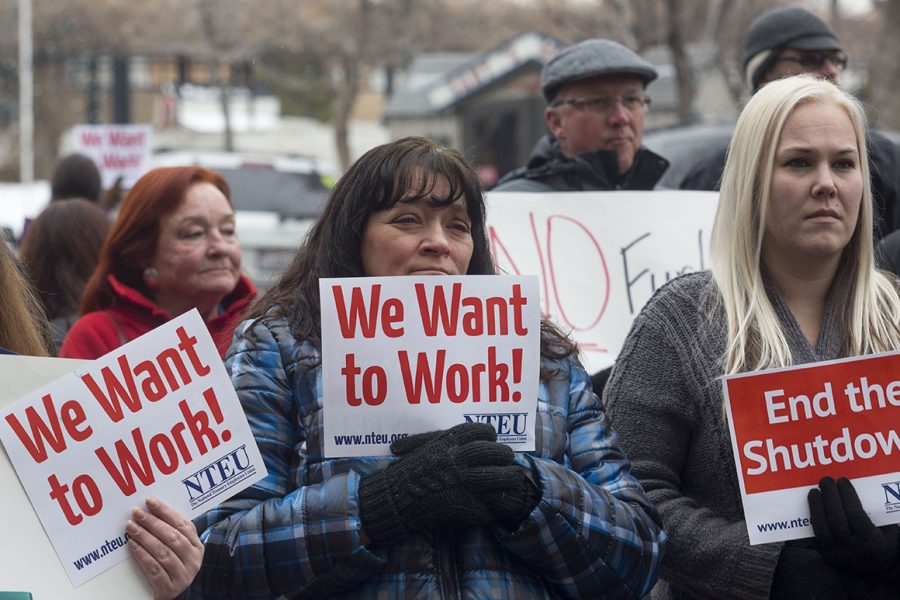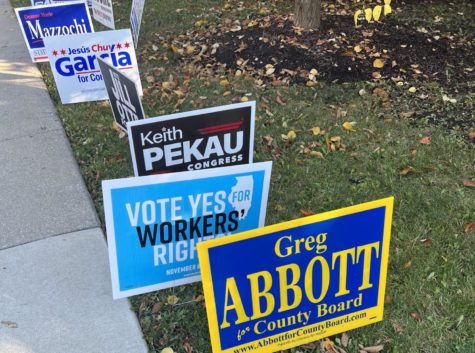The Government Shutdown: What is it and how should it end?
Many furloughed employees have protested against the shutdown as it shows no signs of ending.
On December 21, 2018 the U.S. federal government shutdown began. While not unprecedented, on Jan. 12 this shutdown became the longest in U.S. history, passing the previous record holder of 21 days that occurred during Bill Clinton’s presidency.
The shutdown is only a partial one with 75 percent of the government already being funded until September. At the moment seven outstanding bills have yet to be passed affecting nine different federal departments.
In December, the Senate of the 115th Congress passed a number of bills that would fund the government by a vote of 92-6. That did not include funding for a border wall but did include funding for border security. The House then rejected the Senate’s bills and passed their own bill that included funding for a wall. Later the Senate rejected the House’s bill. No bill was ever presented to President Trump in this process.
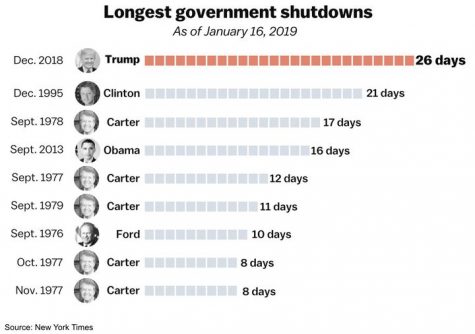
The government shutdown has beaten Bill Clinton’s 1995 shutdown, which was the previous record holder for the longest shutdown.
When the new 116th Congress was sworn in, in early January, the House immediately passed the same funding bills that the 115th Senate had tried to pass, which had funding for more border security but did specifically include funding for the border wall. The House then sent that to the 116th Senate, and the reason why the Senate has not voted on it yet is that Senate Majority Leader Mitch McConnell refuses to call it to vote.
Mitch McConnell’s refusal to bring up this bill to the Senate is unethical in that it is his duty to ensure the welfare of Americans. At the moment thousands of federal employees are not getting paid, with many having to come into work knowing they will leave without a paycheck. Whether McConnell is afraid of crossing the President or is trying to prove a point to Democrats, his behavior is incredibly dangerous. Real, hard-working people are suffering because of his cowardice and McConnell needs to understand that as the shutdown stretches on.
The Democrats could solve the Shutdown problem in a very short period of time. All they have to do is approve REAL Border Security (including a Wall), something which everyone, other than drug dealers, human traffickers and criminals, want very badly! This would be so easy to do!
— Donald J. Trump (@realDonaldTrump) January 5, 2019
Sixth District Congressional Representative Sean Casten addressed his constituents at his first town hall meeting on Jan. 13 in Wheaton, Ill. He said that the shutdown isn’t really a matter of two different bills, one with a wall and one without.
“The fulcrum you are hearing about in the media isn’t really a fulcrum that is available,” Casten said.
As Casten explained, that is because the government could be funded without the wall funding if McConnell puts it on the Senate docket and the Senate can get a veto majority, which would happen if they voted the same way they did in the 115th Congress.
Trump is making it appear that Congress, not including the wall, is continuing the shutdown saying all Congress would have to do is sign a funding bill including $5 billion for the border wall (later increasing it to $5.7 billion).
“Donald Trump is holding firm on his campaign promise to build the wall and the Democrats won’t cave on that issue,” said Colin Lane, junior. “It was his biggest promise for his campaign, everyone knows this. He needs to stand firm on it to get re-elected in 2020, so he will. I think that since he made a promise and he’s sticking to it, he is right by keeping to his word.”
In regard to the border wall, which has dominated the news cycle for the past month, many people believe the shutdown won’t end without the wall being included in a new bill. That is false. The shutdown can end if McConnell puts the bill that has passed the House through the Senate. The border wall does not need to be included in the bill as it had passed the same Senate one month prior.
“Any viable compromise will need to carry the endorsement of the president before it receives a vote in either House of Congress. Under these conditions… the package presented by the House’s new Democratic leaders yesterday can only be seen as a time-wasting act of political posturing,” McConnell said from the Senate floor.
In actuality, McConnell’s lack of concern for the effect the shutdown is having on American citizens, by not calling the bill to a vote, is irresponsible and dangerous to the core of our country’s principles that our founding fathers created. McConnell is pandering to one man’s illogical and costly idea of a border wall.
The government is shutdown because McConnell refuses to let the Senate vote. ONE man is blocking 820,000 federal employees from getting paid. ONE man is blocking food assistance, domestic violence protection, tax assistance and housing support to millions of Americans. One man. https://t.co/iT98TSN1av
— Sean Casten (@SeanCasten) January 15, 2019
“I came [to this event] because I feel very strongly that this is a manufactured crisis,” said Ruth Gaunke, who attended the Casten town hall. “The government shutdown is hurting real people and the [border] wall is unnecessary and based on a campaign promise that never was at all practical or an effective way of handling border security.’’
Our founding fathers decided that the government’s purse was to be controlled by Congress, as that would be the fairest and democratic. It was not meant for individuals to control it, which is what is happening at the moment. The power of our treasury was meant to support the American people, which could only occur within Congress.
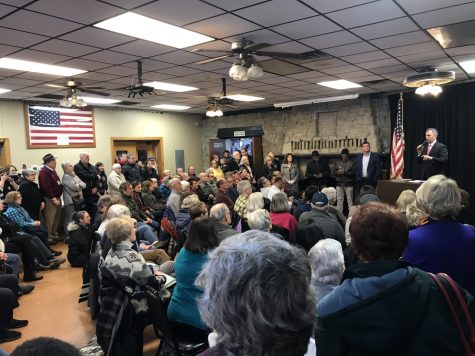
Congressional Representative Sean Casten held a town hall to address his constituents concerns about the shutdown.
As a high school student, I wondered if there was anything I could do to help. Sean Casten told me after his address:
“Young people have an amazing ability to raise their voices and be heard… what’s wonderful about this moment we are in, prior to the last election an awful lot of politicians assumed that you could safely ignore young people because they don’t vote,” Casten said. “This last election young people came out in huge numbers and voted. People are paying attention to that so use your voice, let people know [what] your opinions are. Don’t limit your voice to your own elected representatives [and] reach out to others… because there is a lot of power there.”
Around 800,000 federal employees are being affected by the shutdown, with about 380,000 non-critical employees having been sent home without pay. The remaining 420,000 critical employees must work without a paycheck. On Jan. 11, Congress passed a bill to reimburse federal exempt employees for lost wages once the shutdown ends. Contract workers will not be reimbursed. Many furloughed are looking for part-time jobs to pay piling bills as the shutdown stretches on. However many employees are not able to work in their field unless it is for the government, so many are having to work minimum wage jobs. In the 6th district around 4,300 people are being affected.
One of the biggest effects of the shutdown is that the Department of Agriculture’s Supplemental Nutrition Assistance Program (SNAP or also known as food stamps) will give out February’s benefits to the about 39 million low-income Americans on Jan. 20. The issue is that it is too early for the payment, and states are warning those affected that they may not get another payment in 40 days, or possibly even later as they have run out of funds.
A recent trend has been to call in furloughed workers back to work, without pay. The Food and Drug Administration is resuming their food safety inspections with around 700 of the 5,000 inspectors coming back. The Internal Revenue Services ordered 36,000 furloughed workers to return to work, also without pay, in order for Americans to get their tax refunds in time.
Another agency affected is the National Park Service in which 388 of the 737 parks and historic sites are closed. Of the national parks still open like Yosemite, Joshua Tree and Big Bend National Park, permits to go backpacking were not available and trails were closed as the park rangers aren’t patrolling. National parks still open had to eventually close down bathrooms and campsites as the areas were contaminated with garbage.
Transportation Security Administration agents (TSA) are deemed essential workers so they have had to come into a highly stressful job without a paycheck to pay their bills. There are 51,000 TSA agents with up to 6.8 percent so far not showing up to work by calling in sick. The idea that these agents are being overworked and stressed because of the shutdown is frankly terrifying. The irony to this situation is that all of our border security- coastal, airports and border patrol officers are working without pay.
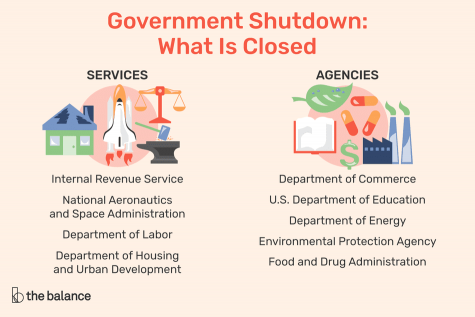
Nine federal departments are not working at full capacity with around 800,000 federal employees being affected by the shutdown.
One furloughed federal employee is Kaki Schnieders, a Hinsdale Central parent. She works as an attorney for the Environmental Protection Agency. Her job mostly involves enforcing all of the federal environmental statutes.
“My agency was open for the first week of the shutdown because we had leftover funds. After that week we stopped operating,” Schnieders said. “I am not working and not getting paid, though Congress passed a bill so that we will get back pay when [the shutdown] is over.”
The EPA is running on a significant decrease in staff with only 944 or 6.8 percent working.
“There are a few people in the office to handle emergencies but aside from that no work is being done,” Schnieders said. “Anyone waiting for a permit, or a decision, or any other interaction with my agency is left waiting. And no one knows for how long.”
Many jobs are being unattended to because of the shutdown.
“For one of my typical cases, if a facility is polluting more than it is allowed by a permit, that will continue to happen. In other instances, a company has agreed to take measures to control its emissions, but it can’t go forward because [the] EPA hasn’t signed the agreement yet,” Schnieders said. “We also have inspectors who should be out in the field making sure facilities are complying, but those people are not working either.”
It is hard to tell when the shutdown will end as this is fundamentally different than previous ones where they were resolved by finding middle ground or compromise exchanging things of importance to each side.
“The fulcrum really comes down to two individuals who have personal agendas…Prior shutdowns have been initiated and controlled by Congress and Congress is a partisan organization which means it has a peculiar logic, but it is logical,” Casten said. “This shutdown is not driven by a party ideology, its driven by individuals who have certain things they are trying to accomplish and that’s tougher to deal with.”
The one thing that is clear is that this shutdown has to end and it can only happen with Mitch McConnell calling the House’s bill to vote. The Senators need to vote in favor of the bill in order to stop this political disaster and get our government running again.

Lia Reichmann, senior, is well versed in anything to do with Friends, Harry Potter, and sports. She likes to go backpacking and taking photos (follow @liareichmann_photography...



